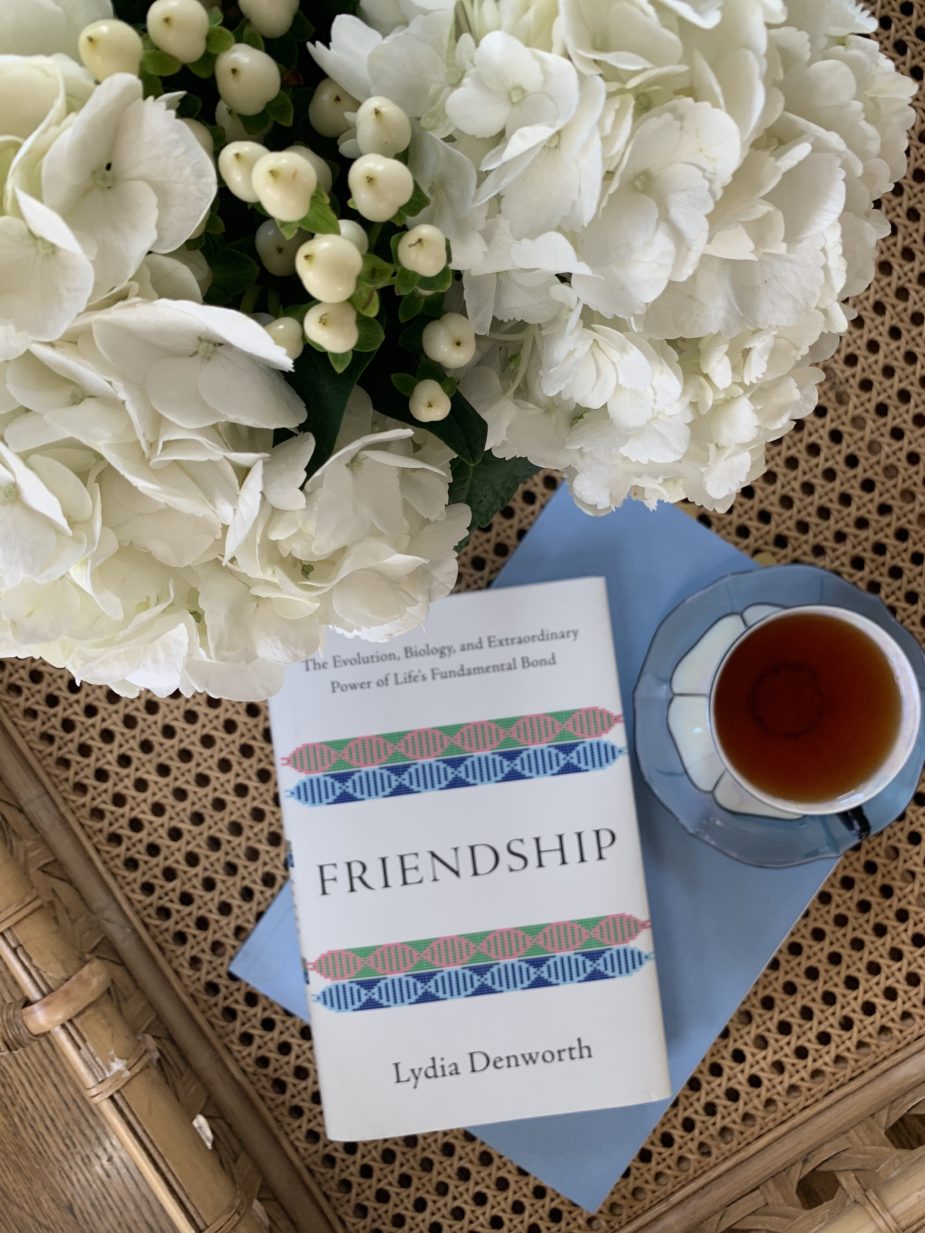274: Quality Friendships = Quality Life
The Simple Sophisticate - Intelligent Living Paired with Signature Style - Un podcast de Shannon Ables - Les mercredis

Catégories:

"By comparison with relationships forged in blood and love, science has historically given friendship short shrift . . . biologists ignored friendships because unlike romantic or mating relationships they were thought not to affect reproductive success . . . most of us are as guilty as scientists of failing to take friendship as seriously as it deserves. We pay lip service to it but prioritize family and romance, ditching our friends when we fall in love, or letting time with them be the first thing to go when we get busy . . . eacg of us is contrainted by time. But we may want to rethink how we apportion the time we have . . . It turns out that friendship does have survival value in the most literal sense—more socially integrated people live longer than those who are less well connected." —Lydia Denworth, author of Friendship: The Evolution, Biology and Extraordinary Power of Life's Fundamental Bond
Perhaps due to the media I consumed in the 80s and 90s, there was an unconscious understanding that romantic relationships were paramount to platonic. Don't misunderstand me, friendships were clearly portrayed in sitcoms such as FRIENDS, Blossom, Seinfeld, The Golden Girls, Will & Grace, Felicity, The Wonder Years just to name a few, but it was clear that the writers were directed to have their leads be in constant pursuit of the desired romantic relationship predominantly and perhaps more importantly.
Subsequently, not aware of the subtle influence of media, in my youth, I made the assumption that friendship was nice, but romance was best. It does appear today, and admittedly maybe due more to my own awareness, that such media portrayals are shifting and broadening to bring to the screen and the pages as well as other media mediums an array of life paths and journeys to find contentment and social connectedness.
The value of quality friendships is arguably one of the most important social components of our lives. For each of us, our quilt of friendships will be unique and include amongst it our acquaintances and community (work and personal) connections as well. It seems to me good, healthy relationships of all types - romantic or platonic - benefit when we have a healthy social well-being which fundamentally rests on our social connections. Of course, a social well-being requires first and continually that we include ourselves as part of the social circle; in other words, we need to honor and respect our true selves and not try to cultivate relationships that are contrary to our true temperament, but rather complement and strengthen.
When we remember to default to regularly checking in with ourselves, we will know when it it best to repair and invest in certain relationships and when it is best to move on. We will respect ourselves enough to know what boundaries to put in place and how to place them.
The great loves of our lives, even the moderately good and life-changing-for-a-period-before-we-both-must-go-our-separate-ways relationships that will hold a special place in our life's journey don't cross our paths frequently. We are fortunate to experience these relationships when we have the courage to step forward and say yes without knowing what the future will hold, but throughout the duration of our lives, it is the friendships, even with those we may fall in love with along the way as we come to know each other intimately, yet honestly, that offer so much more than "filler". They offer love, support, encouragement to step into our best selves and step away from limiting habits. They offer kindness and the reminder when we may doubt it that we are lovely and loved.
Author, Brooklyn-based science journalist and a writer who has contributed to Atlantic and the New York Times, Lydia Denworth has just released a book on Friendship that I was eager to receive as I find it helpful to explore the context of the research we have accepted as absolute truth and that which has thus gone on to influence how we choose to live and construct our lives. Denworth dives deep into the historical and established science and then examines what has been misunderstood or dismissed or ignored. Moving forward she explores the brain and how it learns to be social and then the majority of the book explores how friendship, the desire for it, our ability to connect or not connect plays a role in the quality of our lives and ultimately, how to live a healthy social life full of sound friendships.
Today I would like to share a taste of what I learned as I read Lydia Denworth's new book Friendship: The Evolution, Biology and Extraordinary Power of Life's Fundamental Bond
~Listening Note: Each of the items shared below are discussed in more detail in the audio version of the episode.
~Subscribe to The Simple Sophisticate: iTunes | Stitcher | iHeartRadio | YouTube | Spotify
1. Our overall health reveals the quality of relationships we have in our lives
"As we age, the effects of the life we have lived—including our relationships—inevitably show up in the body. Some are cumulative, some are short term."
"The strength of your friendships at 50 predicts your health at 80."
2. More education and income leads to having more friends
"Education, physical health, years living in the same place, and the number of daily contacts with friends all predicted friendship style. More education, for example, often leads to better social skills, and higher education makes it easier to socialize more widely (at restaurants and concerts, say)."
3. Friendships help buffer life stress
"After puberty, parents no longer buffer stress for children; friends can take their place."
4. A good friendship can be a template for all other relationships
"At its simplest, as in animals, friendship is positive, long-lasting, and reciprocal. Bonds with these traits have the strongest effect on our health and longevity."
5. Welcome a diversity of types of friendships
"There are three main styles of friendship: discerning, independent, and acquisitive."
6. Friendship circles will evolve, grow, change — and that's okay.
7. Social media isn't as bad for relationships as people believe; in fact it's a net positive
8. Ambivalent relationships ("frenemies") are bad for our health
9. It takes about 50 hours of togetherness to make a friend, 200 to make a best friend.
10. Retirement is something to be savored when we invest in friendships
In a study shared in Robert Waldinger's TEDx Talk about friendship and good relationship that has since garned nearly 30 million views he shared "the people who were happiest in retirement had worked at it. They valued and tended to their relationships. They activiely worked to replace coworkers with new playmates. They put in the time."
Similar to so much of our lives that enrich the quality, it is the conscious choices we make that make a difference in our overall contentment and joy as we go about our everyday lives. Friendship is an undercurrent that when tended to can elevate and bring tranquility or cause unsteadiness and make for a rough journey when neglected or ill-tended.
Knowing more, understanding how, is one of the first components to a strong cultivation of what we wish to grow. Certainly, it is not the only step or the final step, but it is important, and then we must be patient with ourselves and those we are building relationships with. In time, good things and a good life will grow.
"Social bonds have the power to shape the trajectories of our lives. And that means friendship is not a choice or a luxury; it's a necessity that is critical to our ability to succeed and thrive. It can even be a model against which other relationships should be measured."
SIMILAR POSTS/EPISODES YOU MIGHT ENJOY:
- The Elements of a Strong Social Well-Being, episode #92
- Grown-ups vs. Adults: The Difference
- 15 Ways to be a Friend Worth Having
Petit Plaisir:
~Lentil and Kielbasa Salad, adapted from Barefoot Contessa's recipe

~Subscribe to The Simple Sophisticate: iTunes | Stitcher | iHeartRadio | YouTube | Spotify
